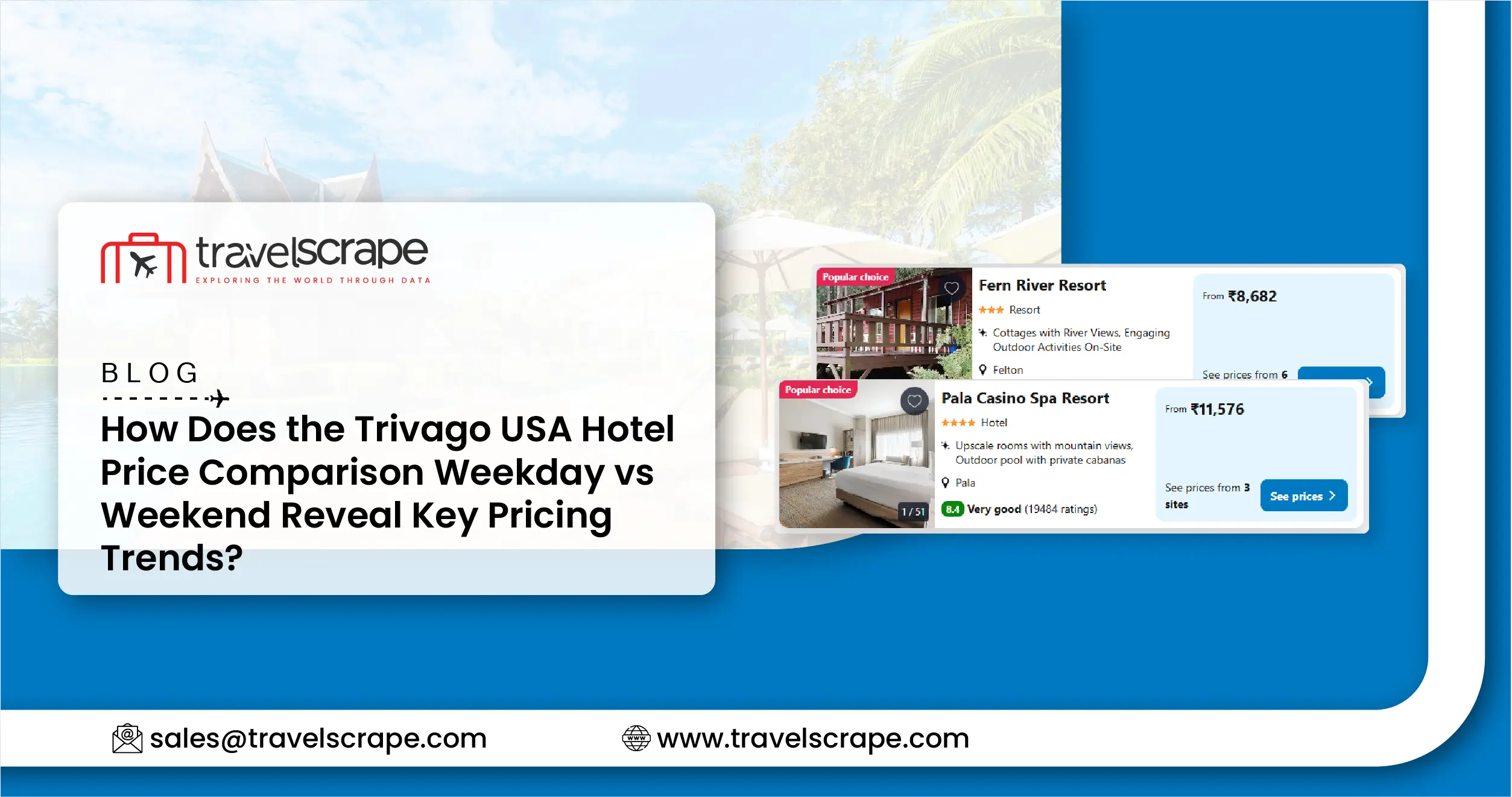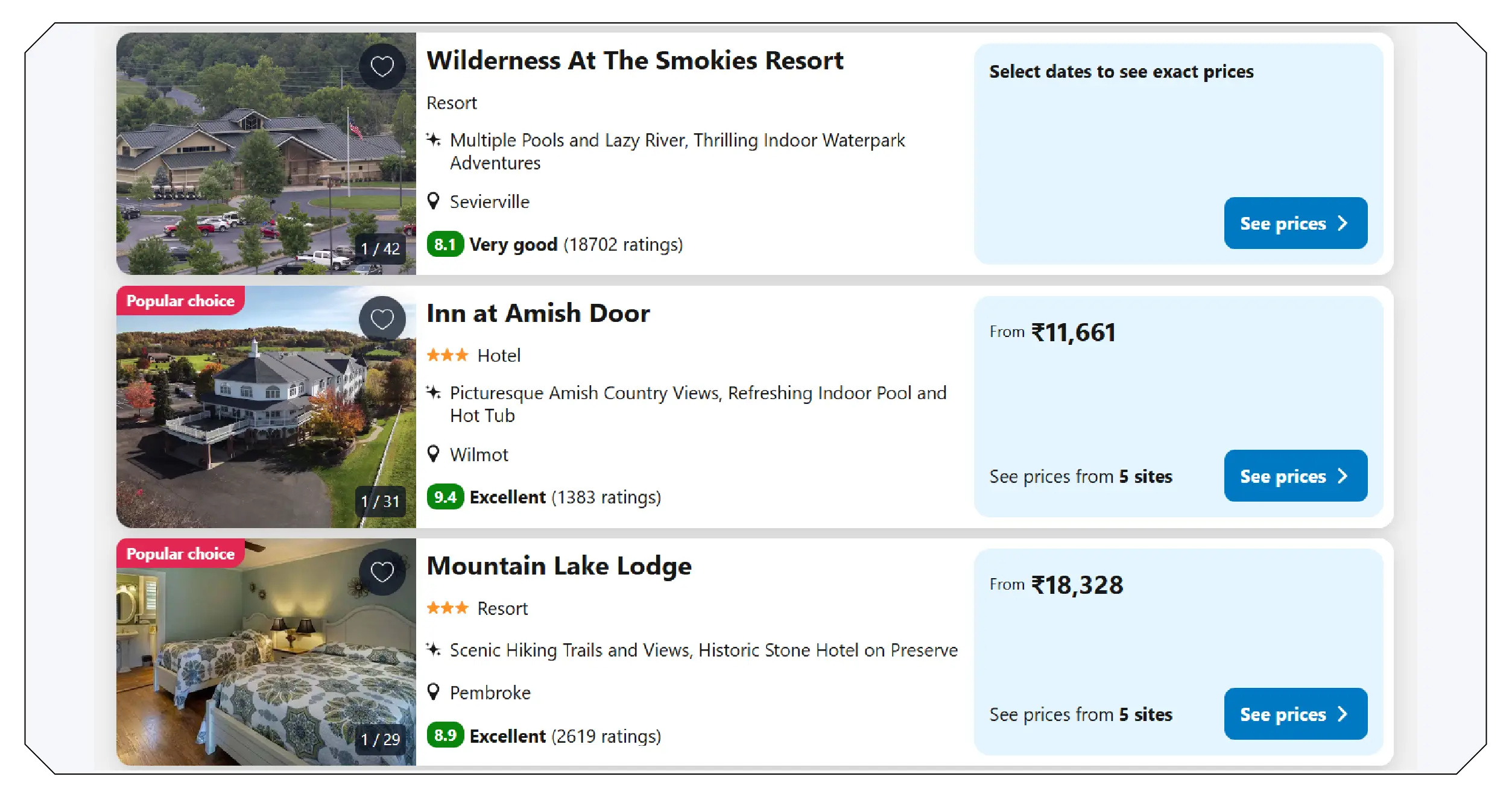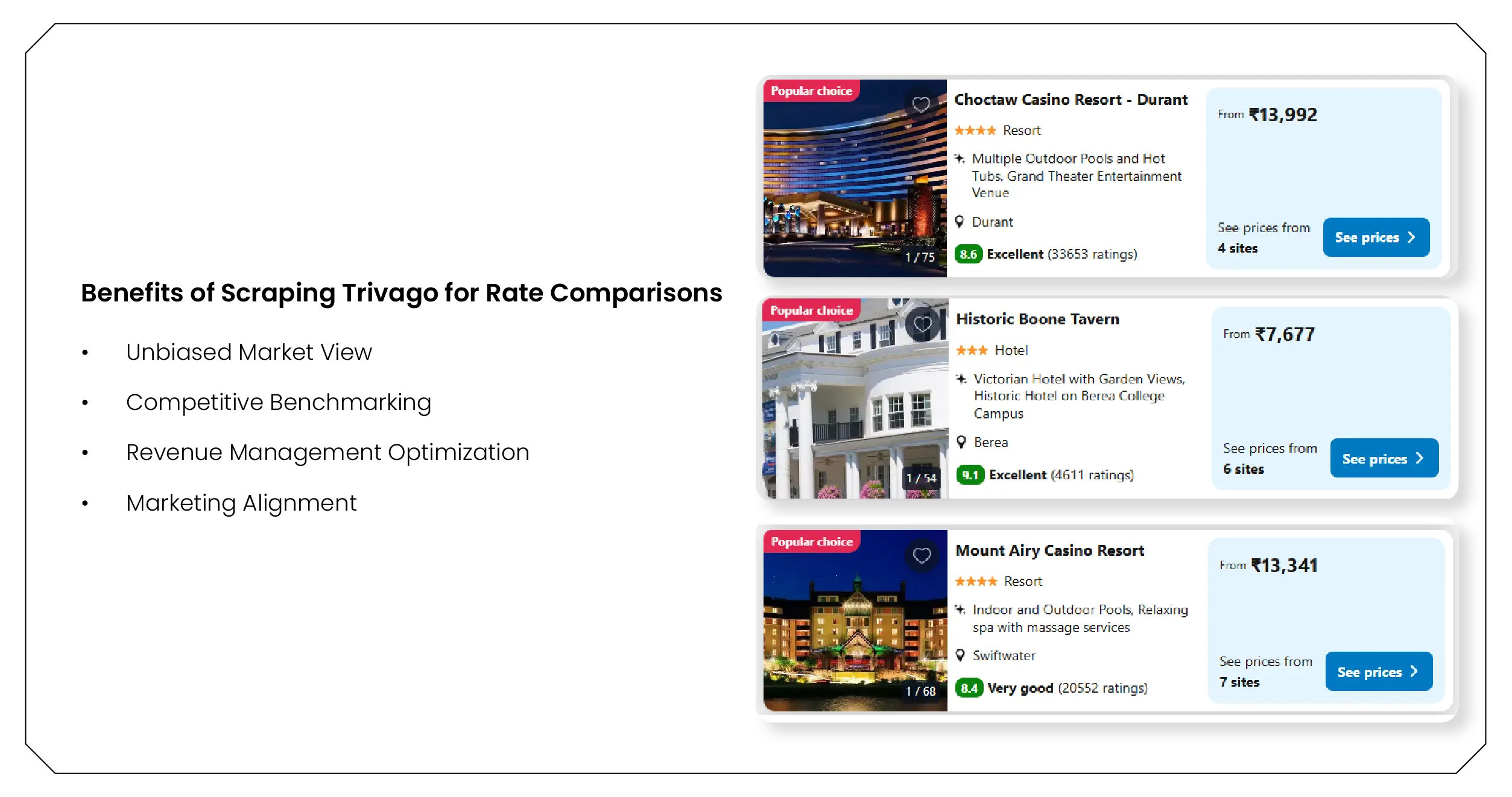How Does the Trivago USA Hotel Price Comparison Weekday vs Weekend Reveal Key Pricing Trends?

Introduction
In the highly competitive hospitality industry, pricing strategies often shift based on demand patterns, traveler behavior, and seasonal factors. One of the most revealing methods for understanding these shifts is Trivago USA's hotel price comparison weekday vs weekend, which provides valuable insights into how hotel rates fluctuate between workdays and leisure days. The ability to collect, process, and analyze hotel rate data from online travel agencies (OTAs) has never been more critical for hotels, travel agencies, and market analysts. By leveraging the Trivago Hotel Room Rates Dataset, hospitality stakeholders can make informed decisions, predict booking patterns, and optimize revenue.
Additionally, Trivago hotel rate analysis enables market observers to track competitive pricing strategies, monitor changes over time, and identify anomalies in the market. With well-structured scraping techniques, extracting this data becomes a powerful tool for shaping dynamic pricing models and enhancing market positioning.
Why Weekday vs Weekend Hotel Rates Matter?

Weekday and weekend hotel pricing strategies differ because customer segments vary significantly between the two periods. Weekday stays often cater to business travelers, corporate events, and conferences, while weekends appeal to leisure travelers, families, and tourists.
Analyzing Trivago data allows businesses to:
- Identify demand trends — spotting peak booking days and adjusting prices accordingly.
- Understand competitor strategies — seeing how rivals price similar accommodations during different parts of the week.
- Optimize promotions — targeting specific days with special offers or discounts to maximize occupancy.
- Forecast seasonal changes — correlating weekdays/weekends with seasonal tourism cycles.
Data Collection Process for Weekday vs Weekend Rates
The process starts with extracting data from Trivago's U.S. listings for various cities, hotel categories, and star ratings. Using USA hotel pricing data scraping, businesses can build datasets that differentiate rates between Mondays through Thursdays and Fridays through Sundays.
This process typically includes:
- City selection — focusing on top tourist and business hubs such as New York, Los Angeles, Chicago, and Miami.
- Hotel selection criteria — filtering by star rating, guest rating, and amenities.
- Date range — ensuring a balance of weekdays and weekends across multiple months to avoid skewed data.
- Data points collected — price per night, cancellation policy, room type, breakfast inclusion, and user rating.
Automation plays a significant role here. With advanced bots and scripts, large volumes of hotel rate data can be captured in real-time, stored, and structured for analysis.
Benefits of Scraping Trivago for Rate Comparisons

Scraping Trivago hotel rates for weekday and weekend comparisons reveals vital pricing trends, helping hotels, travel agencies, and analysts optimize revenue strategies, benchmark competitors, and align marketing campaigns with shifting traveler demand patterns across business and leisure segments.
- Unbiased Market View — Web scraping ensures access to authentic market prices by bypassing promotional or self-reported figures, offering a clear and impartial perspective on actual hotel rates across different locations and dates.
- Competitive Benchmarking — Analyze real competitor rates in detail, enabling accurate performance comparisons, strategic positioning, and informed pricing adjustments to maintain or improve market standing within targeted geographic and demographic segments.
- Revenue Management Optimization — Leverage data-driven insights from historical and real-time pricing patterns to fine-tune hotel rate strategies, ensuring maximum profitability while adapting to seasonal trends and fluctuating customer demand.
- Marketing Alignment — Use detailed rate analysis to craft tailored marketing campaigns that address the unique preferences, booking behaviors, and price sensitivities of both business travelers and leisure-focused guests effectively.
With Hotel Price Data Scraping, stakeholders can make better pricing decisions with greater confidence.
Key Insights from Analyzing Weekday vs Weekend Hotel Prices
When reviewing scraped data, several patterns often emerge:
- Weekday Premium in Business Hubs — Hotels in central financial districts often have higher rates Monday–Thursday.
- Weekend Premium in Tourist Cities — Cities like Las Vegas, Miami, and Orlando often see higher weekend prices due to leisure travel demand.
- Consistent Budget Hotel Pricing — Lower-tier hotels often keep prices stable throughout the week to attract steady occupancy.
- Holiday Spikes — Long weekends and public holidays can disrupt typical patterns entirely.
A real-time hotel price comparison ensures these fluctuations are spotted instantly, enabling rapid response to market changes.
Sample Comparison Table: Weekday vs Weekend Trivago Rates
| City | Hotel Category | Avg Weekday Rate (USD) | Avg Weekend Rate (USD) | % Difference |
|---|---|---|---|---|
| New York | 4-Star | $280 | $250 | -10.7% |
| Miami | 4-Star | $210 | $265 | +26.2% |
| Chicago | 3-Star | $160 | $140 | -12.5% |
| Las Vegas | 5-Star | $350 | $420 | +20.0% |
| Los Angeles | 3-Star | $190 | $185 | -2.6% |
Interpretation: Business hubs like New York and Chicago tend to have higher weekday prices, while leisure-heavy destinations like Miami and Las Vegas peak on weekends.
Applications of Weekday vs Weekend Rate Analysis
- Revenue Management Teams — Adjust daily rates to maximize revenue per available room (RevPAR).
- Travel Agencies — Offer better deals for specific travel days to attract customers.
- Hotel Chains — Maintain competitive advantage across multiple properties in different cities.
- Market Analysts — Predict broader industry trends from micro-level hotel data.
In many cases, hospitality providers rely on Travel Industry Web Scraping Services to keep this data fresh and actionable.
Integrating Rate Data with APIs and Analytical Tools
Beyond static analysis, scraped data can be integrated into pricing dashboards and forecasting tools. Using a Hotel Price Comparison API , teams can:
- Pull daily rate changes in real-time.
- Compare multiple cities and property types instantly.
- Run automated alerts when a competitor changes pricing.
Moreover, OTA Pricing Comparison enables hotels to monitor rates across platforms like Booking.com, Expedia, and Priceline alongside Trivago, ensuring price parity and maximizing visibility.
Ethical and Legal Considerations
While scraping public data is common, it must be done ethically and within legal frameworks:
- Respect robots.txt — Always verify site policies before scraping.
- Avoid server overload — Space out requests to prevent downtime for the source site.
- Compliance with local laws — Different jurisdictions may have specific rules for data collection.
Following these principles ensures long-term, sustainable access to valuable market insights.
The Future of Hotel Pricing Analytics
AI and machine learning are increasingly being used to enhance hotel pricing predictions. Historical Trivago Hotel Room Rates Dataset combined with external data—such as flight arrivals, weather forecasts, and local event schedules—can predict rate changes with high accuracy.
The integration of predictive analytics into revenue management allows hoteliers to:
- Forecast booking demand weeks in advance.
- Test different pricing scenarios before implementing changes.
- Customize offers for direct bookings, bypassing OTA commissions.
This represents the next evolution of Hotel Price Data Scraping , where raw data transforms into actionable intelligence.
How Travel Scrape Can Help You?
- Custom Data Extraction Solutions — We develop tailored scraping tools to collect hotel rates from platforms like Trivago, Booking.com, and Expedia, covering multiple cities, dates, and hotel categories.
- Real-Time Price Monitoring — Our systems track hotel rates continuously, enabling instant alerts on competitor price changes, seasonal trends, or sudden market shifts.
- Structured Data Delivery — We provide clean, well-organized datasets with hotel names, locations, dates, prices, and amenities in CSV, JSON, or API formats for easy integration into your systems.
- Multi-Platform Comparison — We scrape and compare hotel rates across multiple OTAs, giving you a complete competitive landscape for better pricing strategies.
- Scalable Data Coverage — From single-city analyses to nationwide hotel price tracking, our scraping infrastructure adapts to any project size while ensuring accuracy and compliance.
Conclusion
The insights from weekday vs weekend hotel rate analysis are more than just numbers—they reflect traveler behavior, market competition, and economic patterns. Businesses that invest in weekday vs weekend hotel rate comparison USA strategies are better positioned to react quickly to market shifts and maintain competitive pricing.
By implementing methods to compare weekday vs weekend hotel rates in USA using Trivago, hospitality brands gain not just awareness, but a tangible competitive advantage. Whether it’s for revenue optimization, competitive analysis, or travel package customization, the depth of information available through scraping remains unmatched.
With the right methodology, businesses can extract USA hotel rate trends from scraped OTA data to predict seasonal changes, spot emerging travel patterns, and secure higher returns. For those aiming to stay ahead in a competitive landscape, weekday vs weekend rate analysis from Trivago is no longer optional—it’s essential.
Ready to elevate your travel business with cutting-edge data insights? Get in touch with Travel Scrape today to explore how our end-to-end data solutions can uncover new revenue streams, enhance your offerings, and strengthen your competitive edge in the travel market.